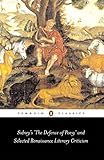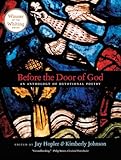The English colony of Jamestown was only 18 years old in 1625, during the midst of what the poet John Donne, preaching safely from London, had called the “barbarous years,” when disease, starvation, and violence nearly destroyed the Virginian settlement. Its unfortunate colonists had been reduced in their most dire straits to exhuming the corpses of the recently dead, so that the living would have something to eat. If anytime would necessitate prayer, it would seem to be when people resort to cannibalism, and no doubt there was rending of garments in Jamestown. Across the Atlantic, too, for the collapse of the Virginia Company humbled an investor named Nicholas Ferrar. A courtier, and eventually an ordained Anglican deacon, Ferrar reacted to the financial implosion of his American investments by taking what money remained and purchasing an abandoned medieval church named St. John’s in the Salisbury village of Little Gidding.
Orthodox in his Calvinism, Ferrar was still High Church, and mourned for what had been lost from that Catholic past of multicolored stained glass and incense burning in thuribles. His little chapel had been stripped bare during the reformation of a century before, and he hoped to restore some ornamentation to that bare-ruined choir. At Little Gidding, Ferrar and his siblings dedicated themselves to founding a secular oratory, what later Puritan critics maligned as a “Protestant nunnery.” The Ferrars were to live simply, by a rigorous schedule of prayer, study, service, and contemplation. Upon the white-washed walls of their home, Ferrar and his brother John and sister Susan (and their respective families) painted psalms, so as to “excite the reader to a thought of piety.” As prayers are outward expressions of inner devotions, sent on vibrations of sound to whatever Ear is listening, the community at Little Gidding displayed their psalms as a type of signpost to the divine, hoping that they’d be noticed. Appropriate for a family that had turned their walls into printed pages, their home into an anthology, because the Ferrars supported Little Gidding with the trade of book binding.
 Critic Don Paterson writes in The Poem: Lyric, Sign, Metre that poetry has “invested itself with those magical properties, and also took the form of spell, riddle, curse, blessing, incantation and prayer. For those atavistic reasons, poetry remains an invocatory form.” Like spells written on hidden parchments, there was enchantment to the textuality of the Ferrars’ house, with its divinely graffitied walls. The house a book based on the Book, which produced books. None more famous or influential than a slender volume of poetry titled The Temple, written by a friend of Ferrar’s named George Herbert, a priest. Ministering a village over, Herbert was a product of courtier culture as well, and of similar social status to the Ferrars, his mother of the wealthy Newport family, and a patron to Donne. Like the pious Ferrars, Herbert had rejected the trappings of nobility that were his guaranteed birthright, preferring rather to work as a humble reverend on the Salisbury plain. When Herbert sent his friend a copy of his devotional poems in 1633, he said that he wished them to be printed should they have “advantage of any dejected poor soul,” and if Ferrar saw no such quality, the verse should be burned.
Critic Don Paterson writes in The Poem: Lyric, Sign, Metre that poetry has “invested itself with those magical properties, and also took the form of spell, riddle, curse, blessing, incantation and prayer. For those atavistic reasons, poetry remains an invocatory form.” Like spells written on hidden parchments, there was enchantment to the textuality of the Ferrars’ house, with its divinely graffitied walls. The house a book based on the Book, which produced books. None more famous or influential than a slender volume of poetry titled The Temple, written by a friend of Ferrar’s named George Herbert, a priest. Ministering a village over, Herbert was a product of courtier culture as well, and of similar social status to the Ferrars, his mother of the wealthy Newport family, and a patron to Donne. Like the pious Ferrars, Herbert had rejected the trappings of nobility that were his guaranteed birthright, preferring rather to work as a humble reverend on the Salisbury plain. When Herbert sent his friend a copy of his devotional poems in 1633, he said that he wished them to be printed should they have “advantage of any dejected poor soul,” and if Ferrar saw no such quality, the verse should be burned.
 Herbert’s The Temple pairs with Donne’s “Holy Sonnets” as among not just the greatest of 17th-century metaphysical poetry but the greatest religious lyrics ever written in English. Poems like “The Collar,” “Love (III),” and his “shape poems” (with typography working as image) such as “The Altar” and “Easter Wings,” were as a type of worship. A century later and the Puritan schoolman Richard Baxter would enthuse that “Herbert speaks to God like one that really believes in God;” obvious faith beats like a metronome in the meter of his verse. “Heart-work and heaven-work make up his books,” said Baxter, so that it’s impossible to disentangle theology from his poetry, as it might be for modern readers of sexier metaphysical poets like Donne. Biographer John Drury writes in Music at Midnight: The Life and Poetry of George Herbert that “Divinity saturated and enclosed his world: the whole of it, from the slightest movements of his own inmost being to his external circumstances in time and the natural world…Divinity was the cause and the sum of how things are, without remainder.” That being the case, Herbert’s poetry itself couldn’t help but be devotional, couldn’t help but fundamentally be as if a prayer. What I’d venture is that all poetry is fundamentally a prayer.
Herbert’s The Temple pairs with Donne’s “Holy Sonnets” as among not just the greatest of 17th-century metaphysical poetry but the greatest religious lyrics ever written in English. Poems like “The Collar,” “Love (III),” and his “shape poems” (with typography working as image) such as “The Altar” and “Easter Wings,” were as a type of worship. A century later and the Puritan schoolman Richard Baxter would enthuse that “Herbert speaks to God like one that really believes in God;” obvious faith beats like a metronome in the meter of his verse. “Heart-work and heaven-work make up his books,” said Baxter, so that it’s impossible to disentangle theology from his poetry, as it might be for modern readers of sexier metaphysical poets like Donne. Biographer John Drury writes in Music at Midnight: The Life and Poetry of George Herbert that “Divinity saturated and enclosed his world: the whole of it, from the slightest movements of his own inmost being to his external circumstances in time and the natural world…Divinity was the cause and the sum of how things are, without remainder.” That being the case, Herbert’s poetry itself couldn’t help but be devotional, couldn’t help but fundamentally be as if a prayer. What I’d venture is that all poetry is fundamentally a prayer.
My ideas may be muddled or inchoate, and for that I beg your patience, but I think that some of my half-formed thinking (multitudinous as it will be) can be illustrated by a Herbert poem appropriately entitled “Prayer (1).” Of the poem’s subject, Herbert describes it as “the church’s banquet…God’s breath in man returning to his birth, /The soul in paraphrase, heart in pilgrimage.” There are two things happening in those lines; the obvious is the connection of God’s Spirit to the individual spirit of man, how the animus of our breath finds its origin in the divine. All fine and good, but what’s more fascinating is the description of prayer as being a “soul in paraphrase,” for that explicitly aligns prayer not with completism—axioms, treatises, arguments, syllogisms, or any other method of total explication—but that prayer provides an intimation of what a soul is. “Prayer (I)” is replete with this language of incompleteness, it’s in some ways a statement against method. He writes of “The six-days world transposing in an hour,” a type of paraphrase of creation itself, and of “A kind of tune,” or the “Heaven in ordinary.” The imprecision of Herbert’s language is precisely the point—prayers are exemplary because they don’t exist to say everything that can be said; they exist for all of that which can’t be. The result of prayer, Herbert famously concludes, is “something understood.”
Everything depends on that indefinite pronoun, for in the ambiguity of “something” Herbert gestures at what prayer is. It’s not necessarily that prayer deals with only the ineffable (though that concept intersects with prayer), but rather that the product of prayer is this amorphous, free-floating, mercurial something of which Herbert speaks. Prayer imparts a type of knowledge—something has been understood. But good luck in being able to simply or literally say what that something is. So, Herbert differentiates prayer from other forms of sacred language; prayer has not the delineation of a creed or the rigor of an argument, it has not the logic of theology, nor the narrative of scripture. Prayer has this understood something, but by its nature what exactly it is must be felt rather than known, believed rather than stated.
The poem is about prayer, but it’s also about poetry. If Herbert is making an argument about prayer’s significance being incompleteness, then the precise same thing must be said about poetry as well. Like prayer, poetry is not the same as creed or argument, thesis or claim, philosophy or pedagogy. Both prayer and poetry are synonyms, albeit respectively associated with the sacred and the profane. They concern things that can only be espied from multiple perspectives, for the ecstasy of ambiguity and the spurning of literalism, for the quality of having “something understood” even if such a thing is contradictory or indefinable or impossible to summarize. The two forms are mechanisms for approaching the unapproachable, they are engines driving us to that which is an infinite distance away. What’s imparted is the mysterious “something”—when done well, prayer and poetry can both change you, but it’s difficult to put into words what that change was. A sublimity in that paradox, for prayer and poetry are defined by being words that gesture beyond words themselves.
All literary language is a special case; all literary language is exception. Since Plato, philosophers have found it difficult to categorize what exactly literature is supposed to be. Fictional narrative, after all, is simply lies artfully arranged. Or at least that’s one way to look at it, albeit a reductionist one that doesn’t perform due diligence toward just how weird literature is, this process by which we hallucinate entire worlds after staring at abstract symbols. Because it seems real, literature compels questions like that jocularly posed by the Shakespeare scholar L.C. Knight, when in 1933 he asked, “How many children did Lady Macbeth have?” Knight was raising a point about the way we talk about fiction, where a question can be posed that is logically and semantically coherent, yet totally meaningless. Lady Macbeth had no children of course, since she wasn’t real (or at least not in the form that the Bard presented to us). A similar metaphysical conundrum was posed by the philosopher Bertrand Russell, when he asked what the “truth status” was of the question “Is the present King of France bald?” There no longer being a King of France, it would seem that either an affirmative or negative answer is completely meaningless, yet that’s affectively the nature of all fiction.
Poetry and fiction aren’t reducible to each other; if anything, they’re sometimes contrasted (in part because narrative poetry, such as the epic, is a largely moribund genre today). But poetry also has an innate weirdness that makes it difficult to classify—what exactly defines it? What makes poetry poetry? Formal characteristics—rhyme, meter, rhythm, and so on—make little sense as a distinguishing characteristic after almost two centuries of free verse. Russian linguist and critic Roman Jakobson argued (in a paper first published in Thomas A. Sebeok’s anthology Style in Language) that the “poetic function” of language was neither to express nor to communicate clear-cut truth, but rather existed with “the message for its own sake.” Jakobson’s claim was that poetry is basically always about poetry, that verse announces the strangeness of language itself rather than communicating literal facts. What defines poetry is not how it’s constructed, but what it does. Poetry announces itself as language through a process of defamiliarization—iambic pentameter and anaphora are ways in which a reader understands that something odd is happening—but it need not be facilitated only through formal rhetorical means. Paterson rightly condemns the fact that “Too often our interpretations are unconsciously predicated on the real-world existence of a truth, albeit a truth conveniently veiled or missing,” but to be overly hung up on the “truth” of poetry is to precisely miss the point. The medium truly is the message.
 In an odd way, such pronouncements were anticipated by the Renaissance critic and poet Philip Sidney, who in his 1580 Defense of Poesy argued that “The poet, he nothing affirms, and therefore never lieth.” Facts can be lied about, but a poem can’t be evaluated on whether it’s “true” or not, at least in any literal or logical way. What’s the “truth status,” Russell might ask, of the statement “I have measured out my life in coffee spoons?” Certainly, it’s not literally accurate, or privy to scientific falsification, but that it says something significant should be obvious. Poetry is thus a cracked type of speech, language that is about language, expressing truths that move beyond mere words but which can be indicated in their splendiferous ambiguities. Poetry is rhetorically distinct from other uses we have for words, Jakobson would argue; it’s not the dry literalism of logic, nor the pragmatic utility of instruction, or even the dense world-building of fiction (though that last certainly can intersect with poetry). Rather verse is when language thinks about itself. Popularizer of religion Karen Armstrong argues something similar in the introduction to Thomas J. Craughwell’s Every Eye Beholds You: A World Treasury of Prayer when she writes that “Prayer helps us to liberate ourselves and to use language in an entirely different way.”
In an odd way, such pronouncements were anticipated by the Renaissance critic and poet Philip Sidney, who in his 1580 Defense of Poesy argued that “The poet, he nothing affirms, and therefore never lieth.” Facts can be lied about, but a poem can’t be evaluated on whether it’s “true” or not, at least in any literal or logical way. What’s the “truth status,” Russell might ask, of the statement “I have measured out my life in coffee spoons?” Certainly, it’s not literally accurate, or privy to scientific falsification, but that it says something significant should be obvious. Poetry is thus a cracked type of speech, language that is about language, expressing truths that move beyond mere words but which can be indicated in their splendiferous ambiguities. Poetry is rhetorically distinct from other uses we have for words, Jakobson would argue; it’s not the dry literalism of logic, nor the pragmatic utility of instruction, or even the dense world-building of fiction (though that last certainly can intersect with poetry). Rather verse is when language thinks about itself. Popularizer of religion Karen Armstrong argues something similar in the introduction to Thomas J. Craughwell’s Every Eye Beholds You: A World Treasury of Prayer when she writes that “Prayer helps us to liberate ourselves and to use language in an entirely different way.”

 Functionally, I see no difference between prayer and poetry. I should emphasize that this doesn’t necessarily have to do with God per se, but rather with what prayer and poetry do. And as both are in some sense very present-based genres, existing for their own purposes rather than to convey some other primary piece of information, what they do is ultimately the same. W.H. Auden famously declared that “Poetry makes nothing happen,” but there is a theological profundity to that, the idea of something existing without pragmatic justification to some bottom line, having being rather as a glorious singularity unto itself. Not dissimilar to the God of the medieval scholastics, whose views the literary critic Terry Eagleton described in The Meaning of Life, writing that God’s purpose and His creation isn’t a “question about what the world is for, since in… [theological] opinion the world has no purpose whatsoever. God is not a celestial engineer who created the world with some strategically calculated goal in mind. He is an artist who created it simply for his own self-delight, and for the self-delight of Creation itself.” The Word of God thus becomes something very close to the word of Auden. Something close to the ecstasy of prayer as well. Poetry fulfills what Jay Hopler described in the preface to Before the Door of God: An Anthology of Devotional Poetry when he noted that “poems confront two of humankind’s most powerful actuations: the drive to create and the drive to know a creator.”
Functionally, I see no difference between prayer and poetry. I should emphasize that this doesn’t necessarily have to do with God per se, but rather with what prayer and poetry do. And as both are in some sense very present-based genres, existing for their own purposes rather than to convey some other primary piece of information, what they do is ultimately the same. W.H. Auden famously declared that “Poetry makes nothing happen,” but there is a theological profundity to that, the idea of something existing without pragmatic justification to some bottom line, having being rather as a glorious singularity unto itself. Not dissimilar to the God of the medieval scholastics, whose views the literary critic Terry Eagleton described in The Meaning of Life, writing that God’s purpose and His creation isn’t a “question about what the world is for, since in… [theological] opinion the world has no purpose whatsoever. God is not a celestial engineer who created the world with some strategically calculated goal in mind. He is an artist who created it simply for his own self-delight, and for the self-delight of Creation itself.” The Word of God thus becomes something very close to the word of Auden. Something close to the ecstasy of prayer as well. Poetry fulfills what Jay Hopler described in the preface to Before the Door of God: An Anthology of Devotional Poetry when he noted that “poems confront two of humankind’s most powerful actuations: the drive to create and the drive to know a creator.”
 Both poetry and prayer are written in a type of transcendent tense, they seem to bring voice forward from a certain perspective of eternity. The visceral presentness of both makes them different from other forms of language, for poetry and prayer don’t merely correspond to things that have happened in the world, but they are a reality itself. Kimberly Johnson writes in the introduction to Before the Door of God that “though a lyric poem may have a narrative that unfolds over its course, the first drama it relates is the coming into being of that speaking voice,” for poetry is an ever regenerative form, it is not ossified representation of some outside subject—it is the subject. Unlike painter Rene Magritte’s visual pun “The Treachery of Images,” with its depiction of a pipe with the sentence “Ceci n’est pas une pipe,” a similar gambit makes no sense with a poem. There is no delay in verse, it has an immediacy that oracularly announces itself as a presence. Poetry and prayer share in this incantational quality, because they trade not only in representation but in a certain theurgy. This is the position that the narrator addresses to God in Charles Simic’s poem “Prayer” included in his collection A Wedding in Hell: “You who know only the present moment, /O Lord, /You who remember nothing/Of what came before.” An encapsulation of prayer and lyric alike, as well as the experience of being God in eternity, for unlike other modes, verse exists perennially in this moment we live in right now.
Both poetry and prayer are written in a type of transcendent tense, they seem to bring voice forward from a certain perspective of eternity. The visceral presentness of both makes them different from other forms of language, for poetry and prayer don’t merely correspond to things that have happened in the world, but they are a reality itself. Kimberly Johnson writes in the introduction to Before the Door of God that “though a lyric poem may have a narrative that unfolds over its course, the first drama it relates is the coming into being of that speaking voice,” for poetry is an ever regenerative form, it is not ossified representation of some outside subject—it is the subject. Unlike painter Rene Magritte’s visual pun “The Treachery of Images,” with its depiction of a pipe with the sentence “Ceci n’est pas une pipe,” a similar gambit makes no sense with a poem. There is no delay in verse, it has an immediacy that oracularly announces itself as a presence. Poetry and prayer share in this incantational quality, because they trade not only in representation but in a certain theurgy. This is the position that the narrator addresses to God in Charles Simic’s poem “Prayer” included in his collection A Wedding in Hell: “You who know only the present moment, /O Lord, /You who remember nothing/Of what came before.” An encapsulation of prayer and lyric alike, as well as the experience of being God in eternity, for unlike other modes, verse exists perennially in this moment we live in right now.
 Because poetry and prayer, as an experience, belong not to the past or the future but rather a continual present, they both have the incantational quality of being able to resurrect that which is gone, of bringing to bear an actual presence with the reading of a poem, the chanting of a prayer. Eagleton, with good reason, sees something fallacious in this claim, arguing in How to Read a Poem that “On this view, form and content in poetry are entirely at one because the poem’s language somehow ‘incarnates’ its meaning,” but dismissing such romanticism by saying that “words which ‘become’ what they signify cease to be words at all.” But that might be precisely the point: that which distinguishes poetry from prose isn’t form, but the quality by which the former does actually, in some way, invoke or “call down” a different reality from the one in which the reader exists— while making allowances to poetic “prose” being capable of that same quality.
Because poetry and prayer, as an experience, belong not to the past or the future but rather a continual present, they both have the incantational quality of being able to resurrect that which is gone, of bringing to bear an actual presence with the reading of a poem, the chanting of a prayer. Eagleton, with good reason, sees something fallacious in this claim, arguing in How to Read a Poem that “On this view, form and content in poetry are entirely at one because the poem’s language somehow ‘incarnates’ its meaning,” but dismissing such romanticism by saying that “words which ‘become’ what they signify cease to be words at all.” But that might be precisely the point: that which distinguishes poetry from prose isn’t form, but the quality by which the former does actually, in some way, invoke or “call down” a different reality from the one in which the reader exists— while making allowances to poetic “prose” being capable of that same quality.
The Harlem Renaissance poet Jean Toomer performs such an incantation in his lyric “Georgia Dusk.” Toomer writes of a “lengthened tournament for flashing gold,/Passively darkens for night’s barbecue” where men gather and “Their voices rise… the pine trees are guitars,/Strumming, pine-needles fall like sheets of rain…/Their voices rise… the chorus of the cane/Is caroling a vesper to the stars.” Poetry is not editorial or syllogism, but it is a calling forth, a transubstantiation. With Toomer’s invocation of this rural black town observing the simple eucharist of a barbecue, how is it not possible to feel the warm breeze of Georgia dusk whistling through the pines, as the yolk dusk descends into the hills, the drone of cicada punctuating the gathering coolness? That Toomer can put the reader there, it seems to me, is not an example of the “incarnational fallacy;” it is simply an incarnation.
Paterson differentiates prose from poetry by noting that with the former, the “well-chosen word describes the thing as if it were present,” but the latter “persists in its attempt to invoke, to call down its subject from above, as if there were no ‘as if’ at all.” That’s because when we read a poem, whether our loud or in our head, we embody the speaker. We’re possessed by the narrator, this spooky character who isn’t quite equivalent with the poet herself. Johnson argues that “poetic speech endures with a kind of immortality. Among other effects, it preserves the human voice far beyond the scale of human life…. the voice that is preserved over centuries comes to the reader’s corporeal as well as intellectual awareness, resurrected anew, as it were, through each new reader’s ears and eyes and breath and heartbeats.”
When we read Marianne Moore’s poem “By the Disposition of Angels,” which takes as its subject this quality of possession itself, we resurrect both Moore and the immanent voice that speaks and exists beyond mere personality, querying “Messengers much like ourselves? Explain it. /Steadfastness the darkness makes explicit? /Something heard most clearly when not near it?” Moore’s poem gives voice, literally and figuratively, to this precise strangeness of poetry and prayer: it’s ability to make us hear that which seems to not be there. “Poet and reader enter a bizarre cultural contract where they agree to create the poem through the investment of an excess of imaginative energy,” argues Paterson, “This convergence of minds adds a holographic dimension to the poem, one denied other modes of human speech. A poem’s elements can sometimes appear to have been summoned into existence with enough potency to engage our physical senses.”
Possession isn’t the same thing as transformation, however. When we pray, we speak to God; as when we read and write poetry, we perhaps speak to our narrators. At their most ecstatic, those things blur into our selves, but when we stand up from the kneeler or close the book we return to being ourselves, what poet Malachi Black describes in his poem “Vespers,” when he writes that “Lord, you are the gulf/between the hoped-for/and the happening.” Any recitation, any reading, has a gulf between it and the actual divine, for a poem must be a mechanism of approaching an eternity that we never quite reach. Ronald Thomas, Welsh poet and Anglican priest, describes in his poem “Kneeling” the “Moments of great calm,/ Kneeling before an altar/Of wood in a stone church/In summer, waiting for the God/To speak.” The simple physicality of his description takes part in that incantational poetics whereby we can transpose ourselves into that private moment, but the illusory nature of that experience isn’t obscured. We are, after all, “waiting” for God to speak, and that uncertainty, that agnostic quiet isn’t incidental to the prayerful qualities of poetry—it’s instrumental to it. Thomas writes, quipping on St. Augustine, to “Prompt me, God;/But not yet. When I speak, /Though it be you who speak/Through me, something is lost. /The meaning is in the waiting.” When Thomas humbly admits that “something is lost,” it’s an acknowledgement that the possessions of poetry are incomplete, yet that gulf between God’s understanding and our fumbling is the vacuum into which poetry must dissipate.
 Because if there is anything that poetry and prayer share, that distinguishes them from other forms of language—be they plays and novels, policy briefs or automobile manuals—it’s that both must engage with that abiding sense of mystery that exists in those silent places where the soul dwells. A novel or a play or an essay can have mystery at its core, and can be all the better for it—but such mystery is incidental to it being in whatever particular genre it happens to be in. Philosopher George Steiner noted in Language and Silence: Essays 1958-1967 that “When the word of the poet ceases, a great light begins,” explaining that “Language can only deal [with]… a special, restricted segment of reality. The rest, and it is presumably the much larger part, is silence.” What differentiates poetry is not form or content, but that poetry is the language that is written not in words, but rather in the gaps between them. Poetry and prayer are implicated in that mystery, that sacrament. “Mysteries expound mysteries,” writes Moore, and it’s a good shared explanation of prayer and its identical twin poetry.
Because if there is anything that poetry and prayer share, that distinguishes them from other forms of language—be they plays and novels, policy briefs or automobile manuals—it’s that both must engage with that abiding sense of mystery that exists in those silent places where the soul dwells. A novel or a play or an essay can have mystery at its core, and can be all the better for it—but such mystery is incidental to it being in whatever particular genre it happens to be in. Philosopher George Steiner noted in Language and Silence: Essays 1958-1967 that “When the word of the poet ceases, a great light begins,” explaining that “Language can only deal [with]… a special, restricted segment of reality. The rest, and it is presumably the much larger part, is silence.” What differentiates poetry is not form or content, but that poetry is the language that is written not in words, but rather in the gaps between them. Poetry and prayer are implicated in that mystery, that sacrament. “Mysteries expound mysteries,” writes Moore, and it’s a good shared explanation of prayer and its identical twin poetry.
 That sense of divine mystery is invoked by our most immaculate of modern devotional poets Denise Levertov in her “Mass for the Day of St. Thomas Didymus” from the collection Candles in Babylon. Writing at the mystical confluence of her duel Jewish and Christian background, between America and Europe, the political and the sacred, Levertov voiced the “deep unknown, guttering candle, /beloved nugget lodged in the obscure heart’s/last recess” more fully than any poet after the Second World War. Levertov is an incarnational poet, able to describe “woodgrain, windripple, crystal, /in crystals of snow, in petal, leaf… fossil and feather, /blood, bone, song, silence.” A poet of immanence, but one for whom all of this world is built not on exhalation, but inhalation, of “our hope… in the unknown, /in the unknowing.” This is the subject of all poetry and prayer, the injunction “O deep, remote unknown, /O deep unknown, /Have mercy upon us.” The beating heart of all poetry and prayer must be this blessed silence, this sacred unknown. Such a faith is what animates both vocations. For when we approach the sepulcher of that which Herbert called “something understood.”
That sense of divine mystery is invoked by our most immaculate of modern devotional poets Denise Levertov in her “Mass for the Day of St. Thomas Didymus” from the collection Candles in Babylon. Writing at the mystical confluence of her duel Jewish and Christian background, between America and Europe, the political and the sacred, Levertov voiced the “deep unknown, guttering candle, /beloved nugget lodged in the obscure heart’s/last recess” more fully than any poet after the Second World War. Levertov is an incarnational poet, able to describe “woodgrain, windripple, crystal, /in crystals of snow, in petal, leaf… fossil and feather, /blood, bone, song, silence.” A poet of immanence, but one for whom all of this world is built not on exhalation, but inhalation, of “our hope… in the unknown, /in the unknowing.” This is the subject of all poetry and prayer, the injunction “O deep, remote unknown, /O deep unknown, /Have mercy upon us.” The beating heart of all poetry and prayer must be this blessed silence, this sacred unknown. Such a faith is what animates both vocations. For when we approach the sepulcher of that which Herbert called “something understood.”
Image Credit: Needpix.
The post Poetry Is Prayer appeared first on The Millions.
Source : Poetry Is Prayer










